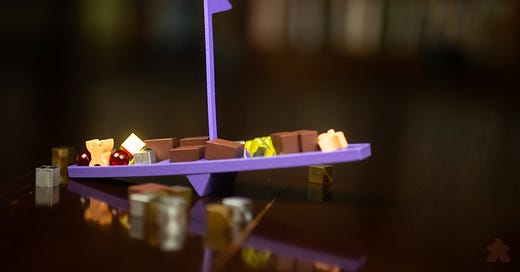Hello, hello! It’s been just about nine weeks since I last sent one of these out, and I promise, there’s a very good reason for it.
Of course, I don’t need to justify myself to you, dear reader, but I will happily share a picture of my son with you. I had eight weeks of parental leave from work, and I decided at some point that I’d also give myself eight weeks of parental leave from this newsletter. That turned out to be a good thing, because I haven’t played nearly as many games lately as I might like. That’s starting to return (and I’ll talk about some games I’ve played lately in this newsletter!) but like all things, it takes time. I’m not overly stressed about it, if we’re being honest. Giving myself time away from the newsletter kept me from stressing about missing a good chunk of the year, and I think I really needed it.
Let’s get on with the show. This newsletter’s a bit different than usual, but I’m starting to suspect half the fun for me is around format variation and trying new things. So, here we go — a little bit of a personal look at motivations.
It’s fun being bad at games.
At least, it’s fun for me, which is good, because it happens with some frequency.
It’s not that I think I’m bad at all games, certainly, but that I’m bad at certain sorts of games. Dexterity games? I’m no good, but I have fun. Bluffing games? I’ll probably crack and laugh mid-bid if I’m trying to really go all-in when I probably shouldn’t. There are plenty of individual games I’m not particularly good at — Dominion, for example, given I’ll fall into the trap of making a highly cyclical but lowly effective deck for myself.
Every time I play these games and do poorly, I have a great time. Reflecting on that is a reminder for me (and hopefully for you? We’ll see!) on the importance of not focusing squarely on success in everything I do. It’s something that can apply equally to my hobbies, my profession, and my personal life, too. Obviously the goal with those three may not always be “have fun,” but setting out with a goal can change my perspective. If that goal is “do something perfectly,” I know I’m probably setting out on a losing proposition.
If I think about my work as a software engineer, my goal is rarely to achieve perfection with a project — instead, it’s to achieve the requirements set out in a way that’s sustainable and can be refactored in the future, avoiding creating too much of a mess for future me along the way. In so doing, I can meet my goals without getting stuck in an endless cycle of searching for perfection.
I love to cook. Something I try to remind myself is that I’ll never learn to cook new things if I stick only to the things I know I can do well. Thus, my goals are often two-fold: Cook something to sustain us for somewhere between four and eight hours, and learn something while I’m cooking. (There’s a component of fun there, too, but that’s more of a tertiary thing. I love to cook, and that’s part of it.) I might try a new technique, a new recipe, or a new cuisine. It might not all come out the way I’d like, but there’s value in the process.
Games are no different for me. My personal motivations often don’t inherently include winning, and I recognize that’s something that can be different for everyone. Remaining competitive? Sure, that can be a good motivation for a lot of games. If I’m playing a deeply strategic worker placement game, for example, I don’t want to feel like a passenger along for the ride.
When I’m playing a strategic game, my goals are to think critically and make interesting decisions. Those decisions, especially if I’m playing a game with which I’m not particularly familiar, might not result in a victory, but that’s not my stated goal. If it’s a side effect of my actions, great! I don’t mind winning, certainly. But if you give me a strategy guide for a board game, I’ll probably just leave it on the shelf. There’s value in figuring those things out over time.
I’ve been playing a lot of trick-taking games lately, which will come as no surprise to you. Of course, some of those have been against a computer (see: Trickster’s Table), and some of those have been in-person, especially with a recent move and a recent baby. One concept in some trick-taking games I really enjoy revolves around bidding for the number of tricks you think you’ll win: You set a goal for what you think you can achieve, then you work to meet that goal in competition with other players. If that results in a victory because you thought you could win more tricks than other players, then did? Great! Again, victory doesn’t have to be my stated goal. It can also be something I’m happy to achieve under the right conditions, should the other goals be met.
And this all revolves back to the introduction on this week’s newsletter, which precedes this section: Something I think has value in my new role as a parent is understanding my goals. I know I can’t raise a perfect child, and I know there are many differing opinions on how to raise a good one. Finding, setting and understanding my goals as a parent helps to ease the anxiety of perfection. I can focus on the process and not on a final outcome. That sounds a little sappy, and it probably is, but that’s been on my mind, and it’s nice to bring it full circle.
I could also have described parenthood as the ultimate cooperative game, so in case you wanted a slightly sappier conclusion to this post, that should spur your imagination toward creating your own. But here, where I’ve talked about it being fun to be bad at games — that’s because the goal doesn’t always have to be dominant victory. It can simply be having a good time placing cool little pieces of plastic, metal and wood on a wooden viking ship. It can be trying to shoot the moon in a game of Hearts, even when it’s not likely. It can be trying a new, weird strategy that probably won’t work, but what if it does? And, sure — sometimes, it’s just fun to win, too.
Some games played
I promised this at the beginning, and here I am: some games I’ve been playing lately.
Viking See-Saw is my latest game played at the time of writing, and I feel really good about getting one of the Itten Funbrick games played on the day they arrived in the post. This dexterity game (and now you see part of the inspiration here) is a game in which you’re placing pieces of luggage on a shared wooden ship that lists from end to end. Your opponents are trying to do the same thing, and that ship’s going to get really crowded. Where will you put your things — and can you do it without knocking anything off the ship? Designed by the legendary Reiner Knizia.
American Book Shop made its way to the table, because Ginny was feeding our son, we were visiting family, and I wanted to introduce something I could explain quickly that plays well at three players. I wrote more about that one not too long ago, actually, in American Bookshop: A new twist on an old trick Designed by the also-legendary Taiki Shinzawa.
Forbidden Island remains a great little cooperative game without too much rule sprawl. (I love, for example, Spirit Island, but I want to take things one step at a time — we played with one of Ginny’s younger cousins, who took to the game like a fish takes to water.). Designed by Matt Leacock, a legend of cooperative gaming.
Nana, a Japanese card game in which you’re trying to form trios of numbers by revealing cards from the ends of players’ hands and a common area, is one I’ll probably be talking about more soon. It’s real simple and easy to teach, and it’s just so clever. Designed by Kaya Miyano.
Lacuna is a two-player area control game with absolutely perfect production. You’re basically placing cool little metal pieces between pairs of cool little wooden tokens, then capturing the remaining tokens you’re closer to than your opponent after both of you have placed your pieces. It’s such a neat little game. Designed by Mark Gerrits.
Well, that’s all I have for you today. I’m looking forward to chatting with you all more soon, and hopefully, I’ll have some more games we can chat about in a week. Until then!







I love this post. I'm actually pretty lousy at lot of the games I really enjoy playing. I've seen different player motivation grid that help identify why people play and I've noticed the games I really enjoy even when I can't seem to ever win, are the games that are highly modular with exploration and building elements. Even more so when I play them with people I love. Lately, I've been on a Wingspan kick and I've got only a 40% win rate. But it's so beautiful and relaxing to play.
Also, congratulations on your new meeple! They are lots of work, but also soooo much fun. :) Totally worth the mess and lack of sleep.
This was beautiful! I love the joy of experiencing things, sometimes new, sometimes old. I'm not great at a lot of games (MetroX for example... terrible 😅) but the fun in playing them is the playing!!